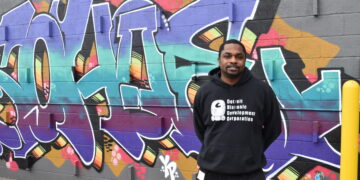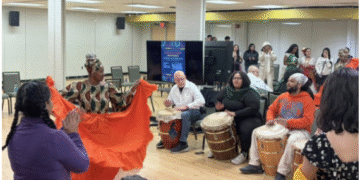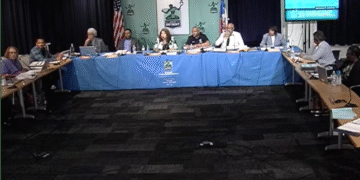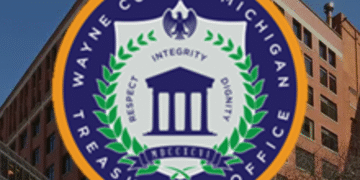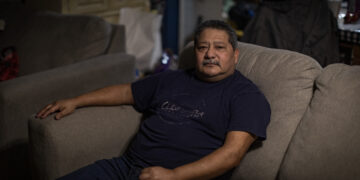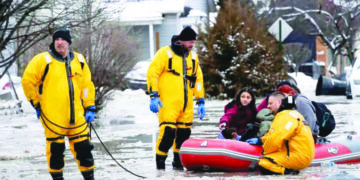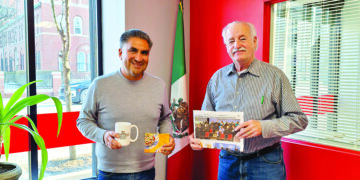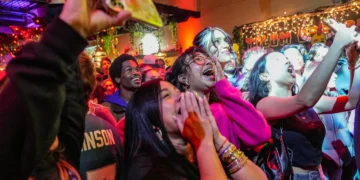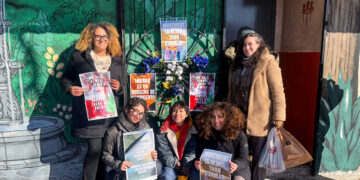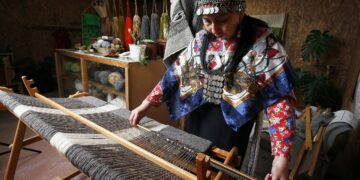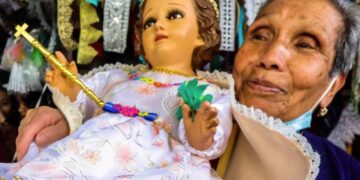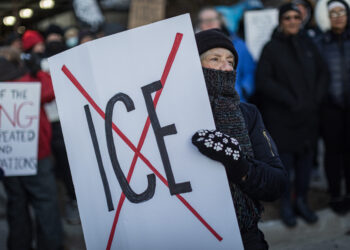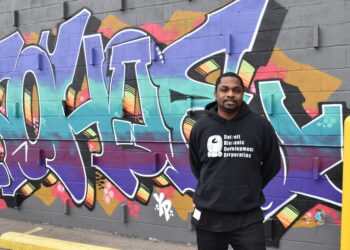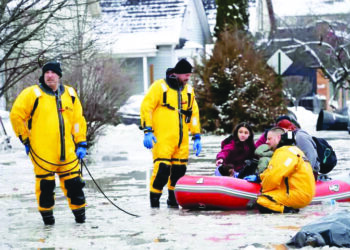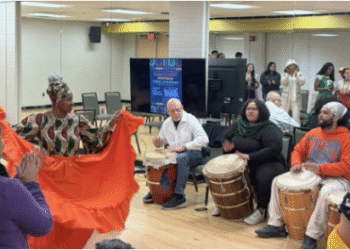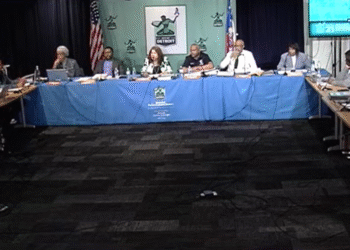Story and Photography by Josue Mata
Out of the many factors that can make life difficult for immigrant communities, inaccessibility to quality, trustworthy legal services are among the greatest. One clinic in Southwest Detroit is working to change that.
Every day, clients crowd the Southwest Detroit Immigrant and Refugee Center lobby. Foreign languages resonate throughout the building as they wait, filling out intake forms. Children swarm around them, asking questions and play-fighting among themselves. Keyboards clack, people talk and printers whir. Immigrants tell their stories through translators, justifying why they should be allowed to live in the United States.
In September, Mexican immigrant Daniel Solorzano, who was given a pseudonym for this story to protect his privacy, found himself in this lobby, seeking long overdue legal advice.
Although he made his appointment in August, the clinic, known as SWIRC, is so busy that appointments are backlogged by a month.
Daniel’s story, like those of many Hispanic immigrants, began in childhood. His parents brought him to the U.S. illegally in 1995, at age 11. “Mom and Dad brought me,” he says, “I didn’t know why we (came), I just knew that we were going to be all together. The whole family.”
His direct clash with the American legal system began in his junior year of high school when he sought to pursue his interests in the medical field. Without documentation and thousands of dollars, he was forced to abandon his dream and settle for work in construction.
Later on, he would marry a U.S. citizen. This would afford Daniel the ability to file for citizenship, but he was unaware of this, and would already be divorced by the time he realized. Before the rise of social media, most undocumented immigrants knew little of the way the legal system worked because they rarely consulted practicing lawyers. They lived in constant fear that anyone could report them to the government, and so consulting just anyone on how to file for legal status was often simply not a choice.
The lack of accessibility to legal resources for many immigrants produces a butterfly effect throughout their lives. “If I would’ve had all (the knowledge I do now), I would’ve probably already submitted everything that I needed for me to have a legal status,” Daniel says, “even though I was already out of school, I could have gone back and done what I really wanted to do. I think it would have been a better life than just in construction.”
Tragedy struck when Daniel’s family was permanently separated. In 2010, his parents were deported from the U.S. and barred from reentry for 10 years. Lacking legal status, Daniel could not leave the U.S. to visit them.
In 2020, they began filing for reentry. The fruits of their labor would be discarded when they died from COVID-19 in 2021 before they could return.
A lack of legal status and trustworthy, accessible legal services is not unique to Daniel. Countless families dealing with a lack of legal status live in fear of being split up every day, and perhaps the most deeply impacted are children. “Students are more highly strung depending on their immigration status and the status of their parents,” says Leslee Przygodski, an eighth-grade teacher at Clippert Academy in Southwest Detroit. “In my opinion, immigration is trauma-causing.”
Przygodski says children often live in fear as a result of their parents’ legal statuses, which makes it difficult to participate in school and form connections with other children that, oftentimes, cannot understand their struggles. “Students feel like they have something to hide or that they can’t really be their true self with everybody because there’s that fear of, you know, can somebody say something? Is this friend going to tell on me?” she explains.
As the economy suffers, prices for necessities rise, and immigrants find themselves having an even harder time finding legal services within their means. Recently, the U.S. has become increasingly unwelcoming to immigrants.
“We are here. We’re trying to do our best. We’re trying to have a life, but the way everything is, it is getting harder and harder for everybody,” Daniel says.
Nevertheless, the future of the Southwest Detroit community remains hopeful. SWIRC is a preview of the bright future our community is working toward. According to founder Kevin Piecuch, SWIRC provides “legal service and advice to those who are most vulnerable and can least afford it, which we believe are immigrants, refugees and people from disadvantaged communities.”
By running off mostly volunteer work, SWIRC has been able to provide Southwest Detroit with accessible, quality legal services for nearly a decade. These legal resources are often administered by volunteers, paralegals and lawyers that come from Southwest Detroit and understand the immigrant struggle.
“I’ve had some former students who have become very successful immigration lawyers,” Pryzgodski says. “They’re doing it from a place of, ‘I want to help the community and I have a passion for this. I see these people who are underserved and I know I can help.”
Countless immigrants and refugees continue to live with inaccessibility to legal services and constant fear of deportation, but the community is working to make life easier for everyone.
SWIRC sees 18 clients on a slow day, yet the community’s legal needs are still not met. “We’re barely scratching the surface. There’s room for 10 SWIRCs in Detroit,” Piecuch says.
Still, improvements in accessibility are being made. Ten years ago, SWIRC had not yet been founded, meaning legal services were even less accessible. In another 10 years, the United States could become far more legally accessible to immigrants if organizations like SWIRC continue to be launched.
“The worst possible outcome is to feel powerless in the face of injustice. If we truly want to make a better world, then take one step, take two. If we’re all willing to commit even a little bit of time and effort to solving any one of our problems, I think we can solve all of our problems quickly,” says Piecuch.
With a newfound vitality and determination to contribute to a brighter future, the immigrants and allies of Southwest Detroit have found the courage to hope for better things and rise from the ashes.
Josue is a rising senior at Cass Technical High School who has possessed a great interest in reading and writing from an early age, and decided to explore these interests further by learning about and practicing journalism. Besides reading and writing, he enjoys listening to music and giving back to the Southwest Detroit community by volunteering at a legal clinic.
Detroit vs Legal Inaccessibility. First published by The Detroit Writing Room’s Journalism Camp in partnership with Coaching Detroit Forward.
Detroit vs Inaccesibilidad Legal
Historia y fotografía por Josué Mata
Del sin número de factores que pueden dificultar la vida de los inmigrantes, la inaccesibilidad a un servicio legal confiable y de calidad es sin duda uno de los más importantes, afortunadamente una clínica en el suroeste de Detroit está trabajando para generar un cambio.
Todos los días, la entrada del Centro de Inmigrantes y Refugiados del Suroeste de Detroit está llena de clientes, los idiomas extranjeros resuenan por todo el edificio mientras se completan los formularios de admisión. Los niños corriendo alrededor de sus padres, hacen preguntas y juegan a pelearse entre ellos. Los teclados suenan, la gente habla y las impresoras zumban. Los inmigrantes cuentan sus historias con la ayuda de los traductores, justificando por qué se les debe permitir vivir en los Estados Unidos.
En septiembre, el mexicano Daniel Solorzano (a quien se le dio un seudónimo para proteger su privacidad) se encontraba en esta oficina, en busca de asesoramiento legal por el que había estado esperando mucho tiempo. Aunque él hizo su cita en agosto, la clínica conocida como SWIRC, está tan saturada que las citas están atrasadas un mes.
La historia de Daniel, como la de muchos inmigrantes hispanos, comenzó en la infancia. Sus padres lo trajeron ilegalmente a los EE. UU. en 1995, cuando tenía 11 años. “Mamá y papá me trajeron”, dice, “no sabía por qué (vinimos), solo sabía que íbamos a estar todos juntos. Toda la familia.”
Su choque directo con el sistema legal estadounidense comenzó en su primer año de secundaria cuando buscó perseguir sus intereses en el campo de la medicina. Sin documentación, ni miles de dólares, se vio obligado a abandonar su sueño y conformarse con trabajar en la construcción.
Más tarde, se casaría con una ciudadana estadounidense. Esto le daría a Daniel la posibilidad de solicitar la ciudadanía, pero él no lo sabía en ese momento y ya estaba divorciado cuando se dio cuenta. Antes del surgimiento de las redes sociales, la mayoría de los inmigrantes indocumentados sabían poco sobre la forma en que funcionaba el sistema legal porque rara vez consultaban a abogados en ejercicio. Vivían con el temor constante de que cualquiera pudiera denunciarlos al gobierno, por lo que hacer una consulta sobre cómo solicitar el estatus legal a menudo no era una opción.
La falta de accesibilidad a los recursos legales para muchos inmigrantes produce un efecto mariposa a lo largo de sus vidas. “Si hubiera tenido todo (el conocimiento que tengo ahora), probablemente ya hubiera presentado toda la documentación para tener un estatus legal”, dice Daniel, “aunque ya estaba fuera de la escuela, podría haber regresado y hecho lo que realmente quería hacer. Creo que hubiera tenido una vida mejor que en la construcción”.
La tragedia lo golpeó cuando la familia de Daniel fue separada permanentemente. En 2010, sus padres fueron deportados de los EE. UU. y se les prohibió el reingreso durante 10 años. Al carecer de estatus legal, Daniel no podía salir de Estados Unidos para visitarlos.
En 2020, comenzaron a solicitar el reingreso. Los frutos de su trabajo se descartarían cuando murieran de COVID-19 en 2021 antes de que pudieran regresar.
La falta de estatus legal y de servicios legales confiables y accesibles no es exclusivo de Daniel. Innumerables familias sin un estatus legal válido viven con el temor de ser separadas todos los días, y quizás los más afectados sean los niños. “Los estudiantes están más nerviosos por su estatus migratorio y el de sus padres”, dice Leslee Przygodski, maestra de octavo grado en la Academia Clippert en el suroeste de Detroit. “En mi opinión, la inmigración causa trauma”.
Przygodski dice que los niños usualmente viven con miedo como resultado de la situación legal de sus padres, lo que dificulta la participación en la escuela y establecer conexiones con otros niños que, a menudo, no pueden entender sus luchas. “Los estudiantes sienten que tienen algo que esconder o que no pueden realmente ser ellos mismos con todos porque existe el miedo de, ya sabes, ¿alguien puede decir algo? ¿Este amigo me va a delatar?” explica la profesora.
A medida que la economía sufre, los precios de los artículos de primera necesidad aumentan y los inmigrantes tienen aún más dificultades para encontrar servicios legales dentro de sus posibilidades. Recientemente, Estados Unidos se ha vuelto cada vez más hostil con los inmigrantes.
“Estamos aquí. Estamos tratando de hacer nuestro mejor esfuerzo. Estamos tratando de tener una vida, pero como están las cosas, cada vez es más difícil para todos”, dice Daniel.
Sin embargo, el futuro de la comunidad del suroeste de Detroit sigue siendo esperanzador. SWIRC es una vista del brillante futuro por el que está trabajando nuestra comunidad. Según el fundador Kevin Piecuch, SWIRC brinda “servicio legal y asesoramiento a las personas más vulnerables y que no pueden costearlo como los inmigrantes, refugiados y personas de comunidades desfavorecidas”.
Al llevar a cabo principalmente trabajo voluntario, SWIRC ha podido brindar al suroeste de Detroit servicios legales accesibles y de calidad durante casi una década. Estos recursos a menudo son ofrecidos por voluntarios, asistentes legales y abogados que vienen del suroeste de Detroit y entienden la lucha de los inmigrantes.
“He tenido algunos exalumnos que se han convertido en abogados de inmigración muy exitosos”, dice Pryzgodski. “Lo hacen por la vocación de seguir su pasión ayudando a la comunidad, al ver la cantidad de personas que están desatendidas”.
Innumerables inmigrantes y refugiados siguen viviendo con inaccesibilidad a los servicios legales y el temor constante de deportación, pero la comunidad está trabajando para hacer la vida más fácil para todos.
SWIRC atiende a 18 clientes en un día lento, pero aun así no se satisfacen las necesidades legales de la comunidad. “Apenas estamos arañando la superficie. Hay necesidad de tener unas 10 SWIRC en Detroit”, dice Piecuch.
A pesar de eso actualmente hay más acceso. Hace diez años, SWIRC aún no se había fundado, lo que significaba que los servicios legales eran aún menos accesibles. Dentro de 10 años, Estados Unidos podría volverse mucho más accesible legalmente para los inmigrantes si se siguen lanzando organizaciones como SWIRC.
“Lo peor que puede pasar es sentirse impotente ante la injusticia. Si realmente queremos tener un mundo mejor debemos poner nuestro granito de arena. Si todos estamos dispuestos a comprometer aunque sea un poco de tiempo y esfuerzo para resolver cualquiera de nuestros problemas, creo que podemos resolverlos todos rápidamente”, dice Piecuch.
Con nueva vitalidad y determinación para contribuir a un futuro mejor, los inmigrantes y aliados del suroeste de Detroit han encontrado el coraje para esperar cosas mejores y resurgir de las cenizas.
Josué es estudiante de último año, de la escuela Secundaria Cass Technical y desde una edad temprana ha tenido un gran interés en la lectura y la escritura, decidiendo explorar estos intereses al aprender y practicar el periodismo. Además de las letras, le gusta la música y retribuirle a la comunidad del suroeste de Detroit como voluntario en una clínica legal.
Detroit vs inaccesibilidad legal. Publicado por primera vez por The Detroit Writing Room’s Journalism Camp en asociación con Coaching Detroit Forward
Traducción por Carmen Elena Luna


